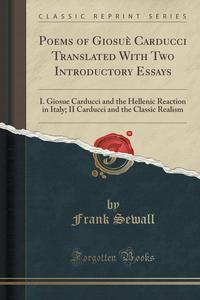Excerpt from Poems of Giosue Carducci Translated With Two Introductory Essays: I. Giosue Carducci and the Hellenic Reaction in Italy; II Carducci and the Classic Realism
In endeavouring to introduce Carducci to English readers through the following essays and translations, I would not be understood as being moved to do so alone by my high estimate of the literary merit of his poems, nor by a desire to advocate any peculiar religious or social principles which they may embody. It is rather because these poems seem to me to afford an unusually interesting example of the survival of ancient religious motives beneath the literature of a people old enough to have passed through a succession of religions; and also because they present a form of realistic literary art which, at this time, when realism is being so perverted and abused, is eminently refreshing, and sure to impart a healthy impetus to the literature of any people. For these reasons I have thought that, even under the garb of very inadequate translations, they would constitute a not unwelcome contribution to contemporary literary study.
I am indebted to the courtesy of Harper & Brothers for the privilege of including here, in an amplified form, the essay on Giosue Carducci and the Hellenic Reaction in Italy, which appeared first in Harper"s Magazine for July, 1890.
About the Publisher
Forgotten Books publishes hundreds of thousands of rare and classic books. Find more at www.forgottenbooks.com
This book is a reproduction of an important historical work. Forgotten Books uses state-of-the-art technology to digitally reconstruct the work, preserving the original format whilst repairing imperfections present in the aged copy. In rare cases, an imperfection in the original, such as a blemish or missing page, may be replicated in our edition. We do, however, repair the vast majority of imperfections successfully; any imperfections that remain are intentionally left to preserve the state of such historical works. Это и многое другое вы найдете в книге Poems of Giosue Carducci Translated With Two Introductory Essays (Frank Sewall)
